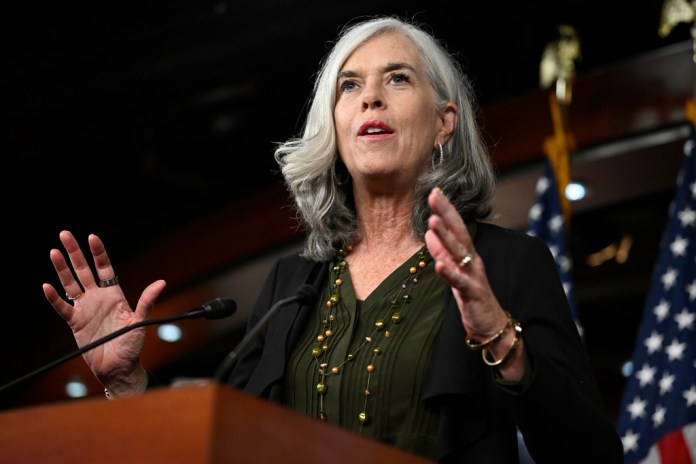This year, dozens of lawmakers worth over $10 million took advantage of an optional program intended to help less well-off members of Congress afford the high cost of maintaining a second residence in D.C., a Washington Examiner review of public records has found.
In 2023, House Democrats quietly tweaked congressional rules by enabling representatives to submit reimbursement requests for tens of thousands of dollars per year in food and housing expenses. The rule change was reportedly spurred by concern among lawmakers after former Rep. Gregg Harper (R-MS) was forced to retire out of financial necessity due to his inability to afford care for his disabled child on top of rent in the nation’s capital.
“My view has always been that you shouldn’t have to be independently wealthy to serve in the United States House of Representatives,” Harper said after announcing his retirement.
The fix intended for people like Harper, however, is also being used by members of Congress who are, by any reasonable definition, independently wealthy.
Using House disbursement records as well as Quiver Quantitative’s analysis of congressional financial disclosures, the Washington Examiner identified 45 members of Congress with an estimated net worth in excess of $10 million who received reimbursements for their lodging or dining expenses during the first half of 2025. These lawmakers collectively billed taxpayers over half a million dollars between January and June to cover their food and housing.
Twenty-eight Republican decamillionaires took advantage of lodging and dining reimbursements, compared to 17 Democrats. Notable figures on both sides of the aisle, such as Reps. Shri Thanedar (D-MI), Marjorie Taylor Greene (R-GA), Mike Collins (R-GA), and House Minority Whip Katherine Clark (D-MA), were among the uber-wealthy taking advantage of the taxpayer-funded reimbursements.
Quiver Quantitative also estimated Rep. Ilhan Omar’s (D-MN) net worth to be over $10 million. However, a spokeswoman for the congresswoman claimed that the figure is inaccurate.
“Since the Congresswoman was elected, there has been a coordinated right-wing disinformation campaign claiming all sorts of wild things, including the categorically false assertion that her net worth exceeds millions of dollars,” a spokeswoman for Omar told the Washington Examiner. “She is a working mom with student loan debt. Unlike some of her colleagues — and similar to most Americans — she is not a multimillionaire. She’s raising a family while maintaining residences in both Minneapolis and D.C., which are among the most expensive housing markets in the country.”

The wealthiest members of Congress to receive reimbursements for their D.C. living expenses — roughly $20,000 each — were Reps. Kevin Hern (R-OK) and Jay Obernolte (R-CA), who are worth an estimated $107.8 million and $97.8 million, respectively. Other members of Congress with an estimated net worth of $50 million or more who have individually racked up thousands of dollars in housing and lodging reimbursements include Reps. Dan Meuser (R-PA), Ralph Norman (R-SC), Roger Williams (R-TX), Marlin Stutzman (R-IN), and Lloyd Doggett (D-TX).
Transparency experts have criticized the reimbursement program as being vulnerable to abuse.
Representatives, for instance, are not required to submit receipts to receive their money, nor are they required to disclose where they’re purchasing their meals or lodging from. A $300 meal reimbursement submitted by a member of Congress could, for instance, represent them splurging at Nobu or buying bulk groceries from Costco — current disclosure requirements make it impossible to tell one from the other.
While members of Congress are paid a salary of $174,000 — well above both the national and in D.C. average — lawmakers need to maintain residences in both their home districts and the capital, which can stretch even an otherwise comfortable salary thin. Members cannot use the reimbursement program to pay their mortgages, only for rentals or hotel stays.
‘AN EXORBITANT AMOUNT’: TOP GOP SENATE AIDE CHARGED TAXPAYERS $44,000 FOR HIS COMMUTE
The additional resources provided by the reimbursement program, the value of which is determined on a rolling basis by the Government Services Administration, can go a long way to helping less well-off people serve in Congress. Critics at the time saw the rule change as a way for members of Congress to give themselves an effective raise without actually changing their salaries, which is generally controversial.
Some have argued that increasing the pay for members of Congress would decrease the ability of moneyed interests to influence policy, reduce corruption, and attract highly talented individuals to office who may otherwise stay in the private sector. Others claim that members of Congress should sleep in their offices and be as frugal as possible with taxpayer funds.
In total, members of Congress were reimbursed $790,646 by taxpayers for their meals and $3.2 million for their lodging between January and June, records show. The Washington Examiner used budget object codes accompanying individual reimbursement transactions to determine which payments were covering food or housing for lawmakers.
The Washington Examiner reached the offices of every congressional decamillionaire who used taxpayer funds to cover their dining or lodging expenses for comment.
